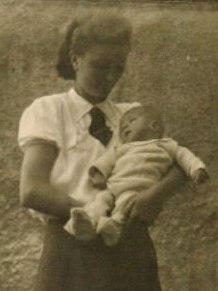Nabokov and concentration camps, part II
During the course of writing The Secret History, I was staggered by the stories I heard from sources and translators whose family lives had been shaped in brutal ways by political prisons and concentration camps. Some, like Nabokov’s family, had fled Russia westward away from Revolution or pogroms, only to have to escape Germany or Poland or France as each fell under Hitler’s control. Others never set foot in Europe, yet the century’s police states and camps became part of their lives. This post is a small tribute to these families and their stories.
There were, of course, those whose relatives had been sent to German camps, which also claimed Nabokov’s brother, as well a key literary patron and others who had been part of his extended circle. Conditions at Neuengamme, for example—the camp outside Hamburg where Sergei Nabokov died—were horrific. Though it was not an extermination camp and conducted minimal medical experimentation, during its most brutal years starvation and forced labor killed most prisoners in weeks or months.
Then there were the lethal landscapes of the northern Gulag, which were detailed at length by a ninety-year-old former inmate of the mining camps of Vorkuta who welcomed me into his home. Sent to the Arctic after an altercation over military service, he worked for years in conditions so unforgiving that for millions, Vorkuta would come to represent the horrors of the system in a single word.
 They were heartbreaking, inspirational, or depressing stories—sometimes all three at once. But they were not just about the Soviet Gulag and Nazi concentration camps.
They were heartbreaking, inspirational, or depressing stories—sometimes all three at once. But they were not just about the Soviet Gulag and Nazi concentration camps.
The wife of the Vorkuta survivor I met shared her story, too. She talked about being deported from Czechoslovakia to Germany during the war to work in a factory there. After Germany’s defeat, she was sent with thousands of other people to a British concentration camp, where she waited with her newborn son to return home. (Many former German camps were turned into holding facilities for populations awaiting repatriation, or prisons for suspected war criminals. In the case of Russian-held territory, some became Gulag outposts or transit camps for those who would be sent eastward as prisoners to the Soviet Union.)
Food that had been commandeered from French farmers during the war was no longer being freighted to Germany. Hunger was everywhere, even among those in the care of Allied troops. The woman’s baby died of health complications from the starvation conditions plaguing the camp. She eventually made her way back to Czechoslovakia alone.
An American translator who wrote letters for me in Czech told me over dinner in Prague about his own family’s saga. In Korea during World War II, his paternal grandfather—a Presbyterian minister—had managed to navigate the intricacies of Japanese occupation. But the arrival of Soviet troops in the northern city of Pyongyang after the war led to intimidation and kidnapping of church leaders. Pressured to join a government-established puppet organization, his grandfather refused. In June 1950, he was arrested on a procedural technicality over incomplete paperwork. He was taken to prison, and his family never saw him again.
The translator’s sister later wrote me detailing the only news they ever had of his fate:
Months later, after UN forces [briefly] liberated Pyong Yang, a stranger came to my grandfather’s house. He identified himself as my grandfather’s cellmate. He told the family that my grandfather had been fine up until the day the Communists fled. The night before, all prisoners were assembled on the ground. They were separated into two groups, one group they set free, the other they took away to another place. The man was in the group they set free, my grandfather in the other. That night my grandfather asked the man to find his family and tell them he was well.
Numerous mass graves were found. The summer heat decomposed the corpses rapidly, making it impossible to identify the dead bodies. So that was the last they ever heard of him.
The same translator’s other grandfather had lived in America during the war. Before U.S. entry into the conflict, he had been a rarity—a Japanese doctor in New York City, with a successful practice treating Japanese patients. The day after Pearl Harbor, he was arrested in a pre-arranged FBI sweep of suspects. He ended up detained all winter, interned at Ellis Island—the same facility that Nabokov had passed through a year and a half earlier as he fled Europe for America.
Conditions on Ellis Island were much less severe than internment facilities and concentration camps overseas, but the lack of heat, sleeping quarters, or adequate food made several people sick. Yet the doctor had nothing with which to treat his fellow prisoners. In addition, his office was padlocked, his bank accounts frozen, and his family could do little to help him or themselves. He was eventually released months later, with no charges against him. Other Japanese-Americans would be far less fortunate, and would find themselves interned for years.
Over time, these kinds of stories grew less surprising, though only because of the frequency with which I heard them. Concentration camps and political prisons, from death camps to internment facilities, littered the century. Though the worst of them have gained a singular notoriety in human history, others have almost been forgotten.
But again and again, in ways small and large, Nabokov did not forget. Witness his use of World War I civilian camps in Despair, and how the delightful, bumbling immigrant professor Timofey Pnin briefly ends up interned on Ellis Island in Pnin due to a comic misunderstanding over a question about anarchism.
I don’t want to give away the key places where The Secret History brings together events in Nabokov’s life or writing with political history, but German camps, Vorkuta, Ellis Island, and other Allied internment facilities all play a part. The stories I encountered of people who had been detained without due process, imprisoned unjustly, sentenced to camps, or in the worst cases, executed or subjected to slow starvation were haunting reminders of the century and the landscapes through which Nabokov and his fellow refugees moved. Those landscapes at times seem distant from the genial, imperious mask he later adopted, but they are always there in the background, waiting to be discovered.
[For more, read part I of this post.]
Image: Young Czech woman with the baby she would lose in a British concentration camp, Germany, 1945 (used courtesy of the subject)
